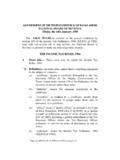Transcription of Civil Code of the People’s Republic of China
1 1 Civil code of the people s Republic of China (Adopted at the Third Session of the Thirteenth National people s Congress on May 28, 2020) Book One General Part Chapter I General Provisions Article 1 This Law is formulated in accordance with the Constitution of the people s Republic of China for the purposes of protecting the lawful rights and interests of the persons of the Civil law, regulating Civil -law relations, maintaining social and economic order, meet the needs for developing socialism with Chinese characteristics, and carrying forward the core socialist values. Article 2 The Civil law regulates personal and proprietary relationships among the persons of the Civil law, namely, natural persons, legal persons, and unincorporated organizations that are equal in status. 2 Article 3 The personal rights, proprietary rights, and other lawful rights and interests of the persons of the Civil law are protected by law and free from infringement by any organization or individual.
2 Article 4 All persons of the Civil law are equal in legal status when conducting Civil activities. Article 5 When conducting a Civil activity, a person of the Civil law shall, in compliance with the principle of voluntariness, create, alter, or terminate a Civil juristic relationship according to his own will. Article 6 When conducting a Civil activity, a person of the Civil law shall, in compliance with the principle of fairness, reasonably clarify the rights and obligations of each party. Article 7 When conducting a Civil activity, a person of the Civil law shall, in compliance with the principle of good faith, uphold honesty and honor commitments. Article 8 When conducting a Civil activity, no person of the Civil law shall violate the law, or offend public order or good morals. Article 9 When conducting a Civil activity, a person of the Civil law shall act in a manner that facilitates conservation of resources and protection of the ecological environment.
3 Article 10 Civil disputes shall be resolved in accordance with law. Where the law does not specify, custom may be applied, provided that public order and good morals may not be offended. Article 11 Where there are other laws providing special provisions regulating Civil -law relations, such provisions shall be followed. Article 12 The laws of the people s Republic of China shall apply to the Civil activities taking place within the territory of the people s Republic of China , except as otherwise provided by law. 3 Chapter II Natural Persons Section 1 Capacity for Enjoying Civil -law Rights and Capacity for Performing Civil Juristic Acts Article 13 A natural person shall, from the time of birth until the time of death, have the capacity for enjoying Civil -law rights, and may enjoy Civil -law rights and assume Civil -law duties in accordance with law. Article 14 All natural persons are equal in their capacity for enjoying Civil -law rights.
4 Article 15 The time of birth and time of death of a natural person are determined by the time recorded on his birth or death certificate as applied, or, if there is no birth or death certificate, by the time recorded in the natural person s household registration or other valid identity certificate. If there is sufficient evidence overturning the time recorded in the aforementioned documents, the time that is established by such evidence shall prevail. Article 16 A fetus is deemed as having the capacity for enjoying Civil -law rights in estate succession, acceptance of gift, and other situations where protection of a fetus interests is involved. However, a stillborn fetus does not have such capacity ab initio. Article 17 A natural person aged 18 or above is an adult. A natural person under the age of 18 is a minor. Article 18 An adult has full capacity for performing Civil juristic acts and may independently perform Civil juristic acts.
5 A minor aged 16 or above whose main source of support is the income from his own labor is deemed as a person with full capacity for performing Civil juristic acts. 4 Article 19 A minor aged 8 or above has limited capacity for performing Civil juristic acts, and may perform a Civil juristic act through or upon consent or ratification of his legal representative, provided that such a minor may independently perform a Civil juristic act that is purely beneficial to him or that is appropriate to his age and intelligence. Article 20 A minor under the age of 8 has no capacity for performing Civil juristic acts, and may perform a Civil juristic act only through his legal representative. Article 21 An adult unable to comprehend his own conduct has no capacity for performing Civil juristic acts, and may perform a Civil juristic act only through his legal representative. The preceding paragraph is applicable to a minor aged 8 or above who is unable to comprehend his own conduct.
6 Article 22 An adult unable to fully comprehend his own conduct has limited capacity for performing Civil juristic acts, and may perform a Civil juristic act through or upon consent or ratification of his legal representative, provided that such an adult may independently perform a Civil juristic act that is purely beneficial to him or that is appropriate to his intelligence and mental status. Article 23 The guardian of a person who has no or limited capacity for performing Civil juristic acts is the legal representative of the person. Article 24 Where an adult is unable to comprehend or fully comprehend his conduct, any interested person of such an adult or a relevant organization may request the people s court to declare that the said adult be identified as a person with no or limited capacity for performing Civil juristic acts. Where a person has been identified by a people s court as a person with no or limited capacity for performing Civil juristic acts, the people s court may, upon request of the person, an interested person thereof, or a relevant organization, and based on the recovery of his intelligence and mental health, declare that the said person becomes a person with limited or full capacity for performing Civil juristic acts.
7 A relevant organization referred to in this Article includes a residents committee, a villagers committee, a school, a medical institution, the women s federation, the disabled person s federation, a legally established organization for senior people , the Civil affairs department, and the like. 5 Article 25 The domicile of a natural person is the residence recorded in the household or other valid identification registration system; if a natural person s habitual residence is different from his domicile, the habitual residence is deemed as his domicile. Section 2 Guardianship Article 26 Parents have the duty to raise, educate, and protect their minor children. Adult children have the duty to support, assist, and protect their parents. Article 27 The parents of a minor are his guardians. Where the parents of a minor are deceased or incompetent to be his guardians, the following persons, if competent, shall act as his guardians in the following order: (1) his paternal grandparents and maternal grandparents; (2) his elder brothers and sisters; or (3) any other individual or organization that is willing to act as his guardian, provided that consent must be obtained from the residents committee, the villagers committee, or the Civil affairs department in the place where the minor s domicile is located.
8 Article 28 For an adult who has no or limited capacity for performing Civil juristic acts, the following persons, if competent, shall act as his guardians in the following order: (1) his spouse; (2) his parents and his children; (3) any other close relatives of him; or (4) any other individual or organization that is willing to act as his guardian, provided that consent must be obtained from the residents committee, the villagers committee, or the Civil affairs department in the place where the adult s domicile is located. Article 29 A parent who is the guardian of his child may, in his will, designate a succeeding 6 guardian for his child. Article 30 A guardian may be determined through agreement among the persons who are legally qualified to be guardians. The true will of the ward shall be respected in determining the guardian through agreement. Article 31 Where a dispute arises over the determination of a guardian, the guardian shall be appointed by the residents committee, the villagers committee, or the Civil affairs department in the place where the ward s domicile is located, and a party not satisfied with such an appointment may request the people s court to appoint a guardian; the relevant parties may also directly request the people s court to make such an appointment.
9 When appointing a guardian, the residents committee, the villagers committee, the Civil affairs department, or the people s court shall respect the true will of the ward and appoint a guardian in the best interest of the ward from among the legally qualified persons. Where the personal, proprietary, and other lawful rights and interests of a ward are not under any protection before a guardian is appointed in accordance with the first paragraph of this Article, the residents committee, the villager s committee, a relevant organization designated by law, or the Civil affairs department in the place where the ward s domicile is located shall act as a temporary guardian. Once appointed, a guardian shall not be replaced without authorization; where a guardian has been replaced without authorization, the responsibility of the originally appointed guardian is not discharged. Article 32 Where there is no person legally qualified as a guardian, the Civil affairs department shall act as the guardian, and the residents committee or villagers committee in the place where the ward s domicile is located may also act as the guardian if they are competent in performing the duties of guardian.
10 Article 33 An adult with full capacity for performing Civil juristic acts may, in anticipation of incapacity in the future, consult his close relatives, or other individuals or organizations willing to be his guardian, and appoint in writing a guardian for himself, who shall perform the duties of guardian when the adult loses all or part of the capacity for performing Civil juristic acts. Article 34 The duties of a guardian are to represent the ward to perform Civil juristic acts and to protect the personal, proprietary, and other lawful rights and interests of the ward. A guardian s rights arising from performance of his duties as required by law are protected by law. 7 A guardian who fails to perform his duties or infringes upon the lawful rights or interests of the ward shall bear legal liability. Where a guardian is temporarily unable to perform his duties owing to an emergency such as an unexpected incident, thus leaving the ward in an unattended situation, the residents committee, the villagers committee, or the Civil affairs department in the place where the ward s domicile is located shall make arrangement as a temporary measure to provide necessary life care for the ward.






